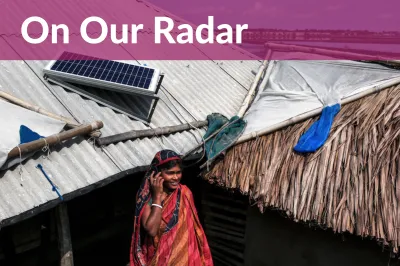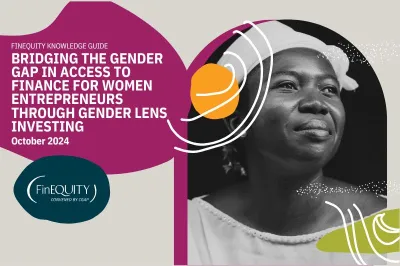FinEquity Monitor

Women’s financial inclusion is an important driver of economic empowerment and development, and FinEquity members are constantly striving to develop impactful programming, researching the drivers of change, and advocating at the highest level. Back in March, FinEquity curated a list of key resources on Women’s Financial Inclusion and Economic Empowerment. This FinEquity Monitor serves as an updated roundup to keep financial inclusion and women’s economic empowerment stakeholders abreast of new publications that can help advance the practice.
The topic of data continues to bear scrutiny: its increasingly digital contours, who uses it, and how, are ever-evolving. Coupled with that, the potential for impact and pace of change in digital services makes digital financial literacy and capability an urgent priority if women are not to be left behind in digital financial inclusion. Over one year from the outset of the COVID-19 pandemic, resilience is a key objective of financial inclusion programing and those closest to women clients share their insights on the role of savings and self-help groups. Across the board, members looking to incorporate women’s financial inclusion into other programs, or looking to enhance their women’s financial inclusion programming can now navigate to relevant modules and case studies in GIZ’s recently published toolkit on women’s financial inclusion.
We hope our community of practice finds the resources we have curated in the list helpful.
Data
How Regulators Use Sex-Disaggregated Data and Regtech to Enhance Financial Inclusion
This publication by the Toronto Centre explores how the authorities in Kenya, Zambia, Colombia, and Peru collect, analyze, and use sex-disaggregated data. It considers how that data relates to regulatory mandates and activities, and to the wider national effort to enhance the financial inclusion of women.
The Stories Algorithms Tell: Bias and Financial Inclusion at the Data Margins
This publication by the Center for Financial Inclusion explores what algorithms can say about who is creditworthy in emerging markets, the risks for those it leaves out, and what it all might mean for inclusive finance.
The FinTech Gender Gap, BIS Working Paper No. 931
This working paper published by the Bank for International Settlements looks at a novel survey of over 27,000 adults from 28 major economies to investigate gender differences in the adoption of new financial technology, allowing for a systematic assessment of gender differences in the use of fintech and potential drivers at the individual and country level.
Digital Financial Literacy
Enabling Women’s Financial Inclusion through Digital Financial Literacy
This brief is a FinEquity community effort and it is meant to help the financial inclusion community understand digital financial literacy and better address this component of the digital financial services gender gap. The synthesis is organized by enablers (literacy, numeracy, access, awareness, and design) and their associated challenges, and highlights the cross-cutting constraint (social norms).
Empowering Women on a Journey Towards Digital Financial Capability
This report by Women’s World Banking focuses on building the knowledge, skills, and attitudes necessary for customers to engage with digital financial services – and with that, goes beyond the work to date on financial literacy, financial capability, and digital literacy. It also offers practical tools to develop digital financial capability initiatives that promote women’s active engagement in digital financial services and their economic empowerment.
Digital Financial Literacy, Guideline Note No. 45
This Guideline Note by the Alliance for Financial Inclusion presents key considerations for regulators and policymakers to understand, develop, facilitate policies, and design interventions at advancing digital financial literacy.
Resilience
Evidence Review of Women's Groups and COVID-19: Impacts, Challenges, and Policy Implications for Savings Groups in Africa
This brief by the Evidence Consortium on Women’s Groups presents emerging evidence from studies in diverse African contexts— with a deep dive into Nigeria and Uganda—on how COVID-19 has affected savings groups and how these groups have helped mitigate the pandemic’s negative consequences in sub-Saharan Africa.
Building Resilience through Self Help Groups: Evidence Review
This review by the Resilience Evaluation, Analysis and Learning (REAL) consortium indicates that Self-help groups (SHGs), and women’s groups more broadly, can have substantial consequences for a range of women’s psychosocial factors. The evidence strongly indicates that psychosocial factors such as social capital and women’s empowerment are important sources of resilience.
Toolkits
Women’s Financial Inclusion Toolkit - Paving the Way for Women's Economic Empowerment
The toolkit by GIZ provides an overview of women’s financial inclusion, its importance, and benefits, then delves into project scoping, design, implementation, and measurement. It gathers tools, guidance, and project ideas and contains seven detailed case studies from various countries with different challenges, target groups, and activities.


